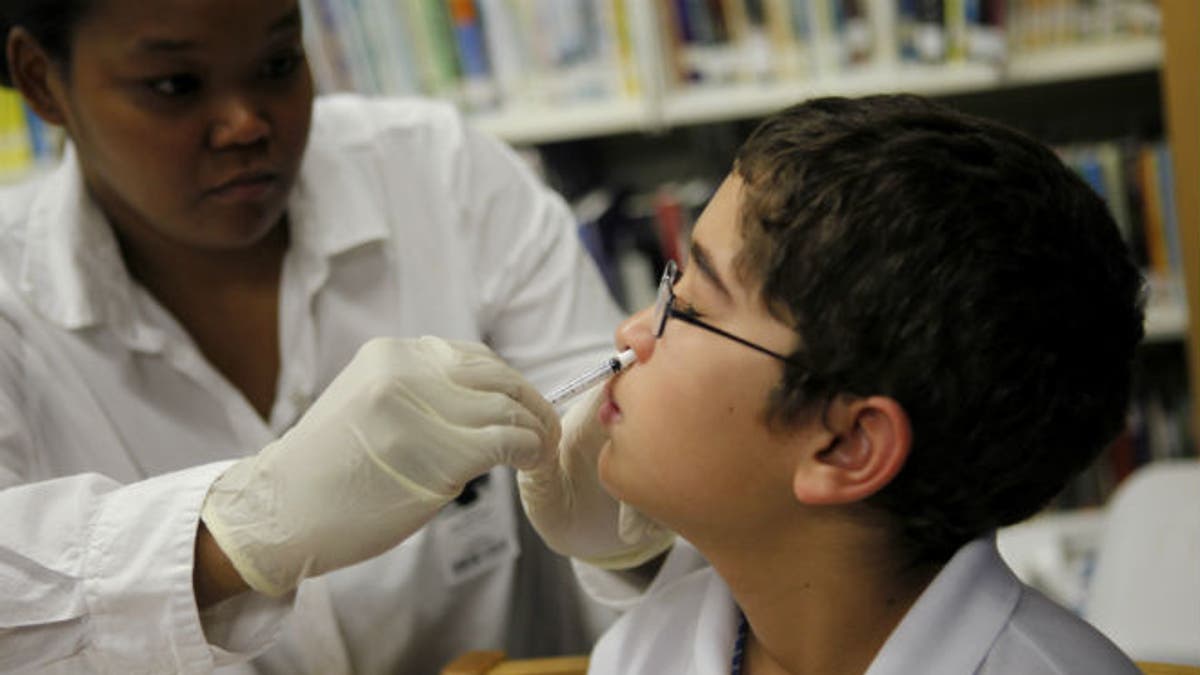
(REUTERS/Carlos Barria)
Nasal-spray flu vaccines appear to be safe for children over age two who have egg allergies or asthma, say UK researchers.
No systemic or severe allergic reactions were seen among 282 egg-allergic children who received the vaccine. Eight kids had mild reactions, such as a runny nose and 26 reported coughing or wheezing up to three days after the vaccine.
Nasal-spray vaccines containing live but disabled influenza virus, known as live attenuated influenza vaccine (LAIV), are cultured in chicken eggs and contain traces of egg proteins.
“On the basis of this data, we do think the intranasal flu vaccine (LAIV) is safe in children with egg allergy,” said Paul Turner, who led the new study, in an email.
“We still need to analyze our data with regards to safety in children who also have asthma, but the preliminary data indicates that children with well-controlled asthma who are well at the time of vaccination do not experience any significant respiratory problems following LAIV,” said Turner, an allergy and immunology researcher at Imperial College London.
Egg allergy is one of the most common food allergies in childhood, affecting an estimated two percent of preschool-age children, Turner and his colleagues write in the Journal of Allergy and Clinical Immunology.
The nasal flu vaccine is considered more effective than flu shots. It was added to UK vaccination guidelines for children in 2013, but not for kids with egg allergies. That’s about 60,000 children in the UK, for whom flu shots – preferably given in a hospital setting – are still advised, which the authors say represents a “significant barrier to successful implementation of the immunization program.”
The U.S. Centers for Disease Control recommends nasal flu vaccines for healthy children between two and eight years old, but also excludes those with asthma or allergies to eggs.
Turner and his colleagues enrolled children ages two to 17 who had been diagnosed with egg allergy, including 186 kids who also had a history of asthma.
The kids were given at least one dose of nasal flu vaccine between September 2013 and January 2014. A total of 151 received the recommended second dose of vaccine.
The children were observed for at least one hour after inhaling the vaccine for symptoms of local or systemic allergic reaction, and parents were contacted by telephone after a minimum of 72 hours to see if any of the children had delayed reactions.
While no systemic or severe reactions occurred, there were 14 mild reactions reported within two hours of vaccine administration, eight of which could have been allergy-related.
Delayed adverse events occurred in 91 children, including 59 cases of upper respiratory symptoms and 20 cases of fever. These events appeared to be similar to previous reports of adverse events for kids without allergies, the researchers note.
The study team found that children with asthma were not more likely to experience any adverse events compared to the other kids.
Turner said that he and his colleagues also performed a sub-study in which they measured how much egg protein must be sprayed into the nose to cause symptoms.
“On the basis of this data, we think it is highly unlikely that where a child experiences nasal symptoms, it is due to the egg in the vaccine,” he said. “We think it's far more likely they are having symptoms due to other vaccine ingredients - in which case the risk of this in egg-allergic children is no higher than in any other child.”
Dr. James Sublett, a pediatric allergist and president of the American College of Allergy, Asthma and Immunology, said there is accumulating evidence that kids who have egg allergies definitely should not avoid vaccines, including flu, measles and other vaccines that potentially have of traces of egg proteins.
“Kids who have egg allergies can get vaccinated - it's a matter of sorting out how allergic they are to the egg, what their risk is, and then working with their pediatrician and a board certified allergy immunologist to try to figure out which is the best pathway to go with the vaccines, because I think the real key is that we don’t want children not vaccinated," said Sublett, who was not involved in the study.
Turner said that clearly, there is a herd immunity effect in flu vaccination, but that children with asthma are also at risk of increased complications from influenza infection.
“So I would argue that for these children, there is also a clear benefit of the vaccine on a personal level,” he said.
Nasal flu vaccines cost around 40 dollars in the U.S., which is about 10 dollars more than flu shots.
